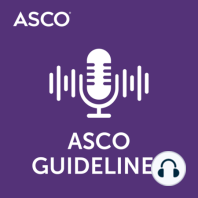15 min listen

Immunotherapy in Patients with Locally Advanced Esophageal Carcinoma: ASCO Guideline Rapid Recommendation Update
FromASCO Guidelines
Immunotherapy in Patients with Locally Advanced Esophageal Carcinoma: ASCO Guideline Rapid Recommendation Update
FromASCO Guidelines
ratings:
Length:
9 minutes
Released:
Aug 18, 2021
Format:
Podcast episode
Description
An interview with Dr. Manish Shah from New York Hospital and Weill Cornell Medicine, co-chair on “Immunotherapy in Patients with Locally Advanced Esophageal Carcinoma: ASCO Guideline Rapid Recommendation Update.” He discusses the results of the Checkmate 577 trial and the updated recommendation of the Treatment of Locally Advanced Esophageal Carcinoma Guideline. For more information, visit www.asco.org/gastrointestinal-cancer-guidelines. TRANSCRIPT [MUSIC PLAYING] SPEAKER: The purpose of this podcast is to educate and to inform. This is not a substitute for professional medical care, and is not intended for use in the diagnosis or treatment of individual conditions. Guests on this podcast express their own opinions, experience, and conclusions. The mention of any product, service, organization, activity, or therapy should not be construed as an ASCO endorsement. BRITTANY HARVEY: Hello, and welcome to the ASCO Guidelines Podcast Series, brought to you by the ASCO Podcast Network, a collection of nine programs covering a range of educational and scientific content and offering enriching insight into the world of cancer care. You can find all the shows, including this one, at ASCO.org/podcasts. My name is Brittany Harvey, and today I'm interviewing Dr. Manish Shah from New York Hospital and Weill Cornell Medicine in New York, NY, co-chair of the Locally Advanced Esophageal Carcinoma guideline expert panel and lead author on the Immunotherapy in Patients with Locally Advanced Esophageal Carcinoma: ASCO Guideline Rapid Recommendation Update. Thank you for being here, Dr. Shah. MANISH SHAH: Absolutely. Thank you very much for having me. BRITTANY HARVEY: First, I'd like to note that ASCO takes great care in the development of its guidelines and ensuring that the ASCO conflict of interest policy is followed for each guideline. The full conflict of interest information for this guideline is available online. Dr. Shah, do you have any relevant disclosures that are directly related to this guideline? MANISH SHAH: Yes, so I do have relationships with many of the companies that make checkpoint inhibitors. And in fact, we are being supported by Bristol Myers Squibb on a first-line study of chemotherapy with nivolumab. We've also been supported by Merck on a pre-operative study of chemotherapy with radiation and pembrolizumab. BRITTANY HARVEY: Thank you for that information. Then so what prompted this rapid update to the Treatment of Locally Advanced Esophageal Carcinoma: ASCO Guideline? MANISH SHAH: Yes, so recently there was a landmark study that was practice-changing in the space, published in the New England Journal of Medicine by Ronan Kelly and colleagues. And this was the report of CheckMate 577, the use of adjuvant nivolumab in resected esophageal or gastroesophageal junction carcinoma. And this was a positive study that led to important changes in practice. And we felt that this was worthy and worthwhile of getting it out there to the community. BRITTANY HARVEY: Great. Then based off this new data from CheckMate 577 on nivolumab, what is the updated recommendation? MANISH SHAH: Sure. So previously, the data available was that patients who receive chemotherapy and radiation and then went on to receive surgery, that those patients with esophageal cancer had no further treatment recommendations. This study, CheckMate 577, actually examined nivolumab in that context. So patients who received chemotherapy and radiation and then underwent surgery, if they had some residual disease at the time of the surgical resection, even if they had a major response but there was some residual cancer in the surgical specimen, patients were eligible for randomization. And about 800 patients were randomized, 2 to 1, to receive nivolumab versus placebo in this context. And the primary endpoint in the study was disease-free survival. And patients who received nivolumab had a median disease-free survival of 22.4 months compared to placebo, which was the
Released:
Aug 18, 2021
Format:
Podcast episode
Titles in the series (100)
Management of Immune-Related Adverse Events Guideline: An interview with Dr. Bryan Schneider of the University of Michigan on the ASCO clinical practice guideline to increase awareness, outline strategies, and offer guidance on the recommended management of immune-related adverse events in patients... by ASCO Guidelines